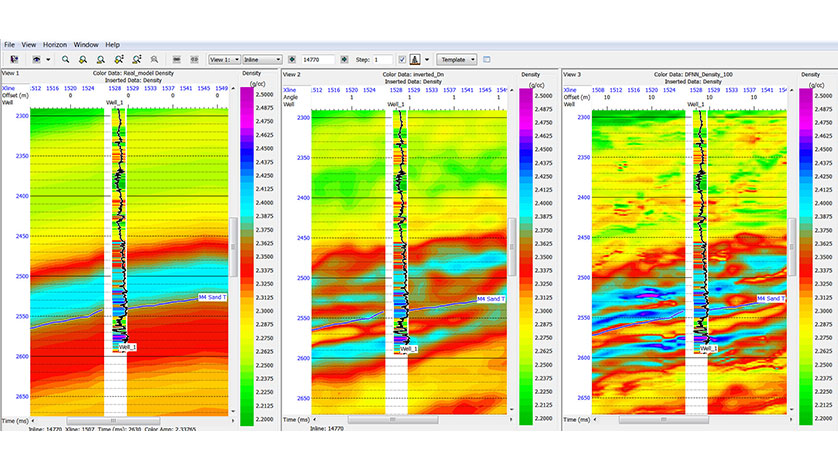CGG’s digital transformation program brings new services and products to oil and gas industry

Machine learning applications for reservoir characterization: From left to right, the low-frequency inversion starting model, predicted density from inversion using HampsonRussell Strata, and the predicted density from HampsonRussell Emerge using Deep Feedforward Neural Network analysis (image courtesy of CGG GeoSoftware).
There is a lot of buzz around “Digitalization”. It’s trending on social media and in countless business journals around the globe. To different people it means a variety of different things from Big Data to the Cloud and the Internet of Things. So what is it and what does it mean for geosciences in the oil and gas industry?
There are numerous definitions around the idea of “the creation of new business insight and business value using data”. However, this is what the upstream industry has been doing for decades: acquiring, processing, analyzing and interpreting data to deliver business value. Although much of the data in the oil & gas industry is already digital, it is likely that a large proportion of that data is still somewhat isolated and inaccessible and underused for decision-making. So, for our industry, perhaps the real challenge and opportunity will be “the creation of new business insight and business value using most, or all, of the data.”
Digitalization will see companies transform more of their data into accessible digital databases/lakes which will enable the application of data science on large and diverse data sets. Here “data science” covers disciplines such as Big Data analytics and machine learning which are proving so popular in other industries.
CGG is well aware of the challenges of digitalization. As an integrated geoscience company it has a large library of geophysical and geological data, which it recognized could generate greater value if it was fully digital and accessible. In addition, it has a full range of commercial software which could take advantage of the new technologies and trends.
As a consequence, it embarked on a digitalization program in 2014. At that time, considering how to progress presented a conceptual, organizational, technical and commercial challenge, and a learning opportunity and experience that was shared by many companies in our industry. Some of the projects addressed the absolute fundamentals of being digitalization-ready, such as having an IT platform which could support Big Data and a common database format which could support a diverse geoscience data lake. Other projects focused on how to deliver the promised business value by developing and implementing new data mining, artificial intelligence and visualization techniques.
At this year’s EAGE conference CGG will be showcasing early results from its digitalization program in the form of new services and products that it can offer the industry today.
Smart Data Solutions are at the heart of CGG’s digital transformation efforts and commercial services, from media conversion to data remediation and integration using machine learning automation to build consistent geoscience databases that are ready for data science.
The Robertson New Ventures Suite is the first commercial result from CGG’s GeoVerse™ digital transformation program for geoscience data. Built from the rich and extensive Robertson geologic multi-client library, this family of geoscience tools and databases share a universal data architecture and taxonomy to provide integrated workflows that enhance new ventures and exploration activity. Daily booth theater presentations featuring exploration case studies will demonstrate how the suite can be used to de-risk exploration.
CGG GeoSoftware is also taking advantage of new digital opportunities presented to our industry, and have enabled their products to run in the cloud and are progressing the benefit of flexibility and compute power scalability that it offers. In addition, the latest release of PowerLog™ enables users to solve complex petrophysical and reservoir engineering challenges by accessing external machine learning and deep learning Python programs, opening up vast possibilities for leveraging open source technology and solutions, and designing bespoke workflows. The first commercial Neural Network-based approach for reservoir characterization was released over 20 years ago in HampsonRussell’s Emerge geostatistical attribute prediction module. Innovation continues in the HampsonRussell software with planned release of advanced Deep Feed Forward Neural Network technology, and native Python extensions in 2018.
By CGG

